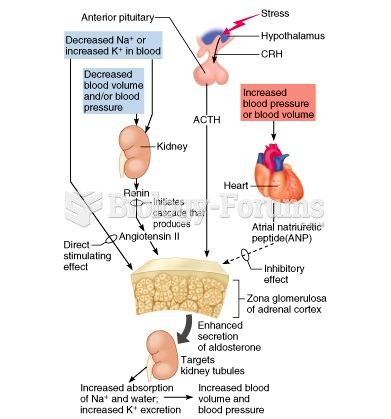|
|
|
Patients should never assume they are being given the appropriate drugs. They should make sure they know which drugs are being prescribed, and always double-check that the drugs received match the prescription.
Blood is approximately twice as thick as water because of the cells and other components found in it.
In the United States, there is a birth every 8 seconds, according to the U.S. Census Bureau's Population Clock.
In most cases, kidneys can recover from almost complete loss of function, such as in acute kidney (renal) failure.
Adolescents often feel clumsy during puberty because during this time of development, their hands and feet grow faster than their arms and legs do. The body is therefore out of proportion. One out of five adolescents actually experiences growing pains during this period.







